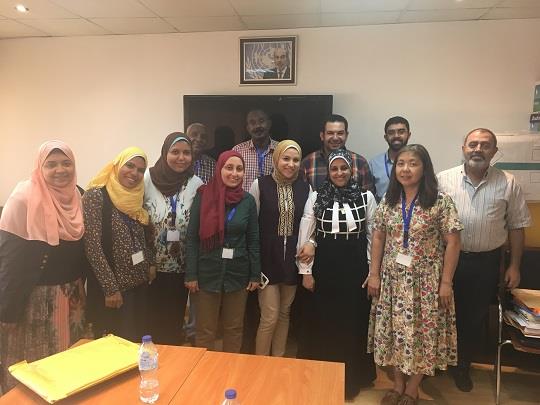FAO trains staff from Egyptian and Sudanese laboratories on the transport of infectious substances

Training participants.
10 July 2018, Cairo, Egypt - The Emergency Centre for Transboundary Animal Disease (ECTAD) of the Food and Agriculture Organization of the United Nations in Egypt (FAO Egypt), in collaboration with FAO’s Regional Office for the Near East and North Africa (FAO RNE), organized a regional training course on infectious substance transport in Cairo from 8-10 July 2018.
The training was facilitated and conducted by Dr. Akiko Kamata, FAO Animal Health Officer. The training targeted staff members from different Egyptian laboratories including the Animal Health Research Institute (AHRI), National Laboratory for Veterinary Quality Control and Poultry Production (NLQP), Central Laboratory for the Evaluation of Veterinary Biologics (CELVB), Veterinary Serum and Vaccine Research Institute (VSVRI) and Central Public Health Laboratories (CPHL) of Ministry of Health, in addition to participants from Sudan.
This training aimed at educating participants to become knowledgeable about the Dangerous Goods Regulations (DGR) produced by the International Air Transport Association (IATA), which serves as a user-friendly "field manual" for air transport of all dangerous goods (including explosives, radioactive materials, etc.). The manual is set in an easy-to-interpret format and is based on the World Health Organization of the United Nations (WHO) document titled “Guidance on Regulations for the Transport of Infectious Substances 2017–2018”. This course also provided training material for shippers of Infectious Substances (Class 6.2 of Dangerous Goods only, and for official personnel only), therefore availed participants with the required information to safely ship infectious substances.
The course is divided into modules that addressed classification, documentation, marketing, labelling, and packaging of infectious substances as well as the preparation of shipments requiring the utilization of dry ice.
“This course will enable participants to apply the technical skills of shipping infectious substances via air using the current Infectious Substances Shipping Guidelines as indicated in the most recent IATA Dangerous Goods Regulations Manual; apply the step-by step workbook in conjunction with the current Infectious Substances Shipping Guidelines publication; promote safe and efficient handling practices in the workplace; and facilitate shipments in compliance with the applicable regulations,” said Lotfi Allal, ECTAD Team Leader in Egypt.
“A certificate for the successful completion of the ‘Training on Transport of Infectious Substance by Air’ was awarded to participants who obtained a grade of 80% or higher on the final exam. The certified person can now sign on a Dangerous Goods Declaration when sending a cultured pathogen e.g. virus or bacteria,” said Toni Ettel, Program Operations Officer at FAO Egypt.
It is to be noted that most of the airlines and hub-airports are IATA members/associates, accordingly full compliance to the DGR is required when shipping Infectious Substances by Air.
